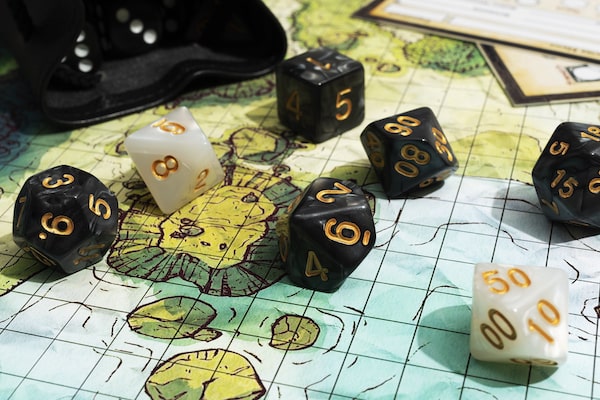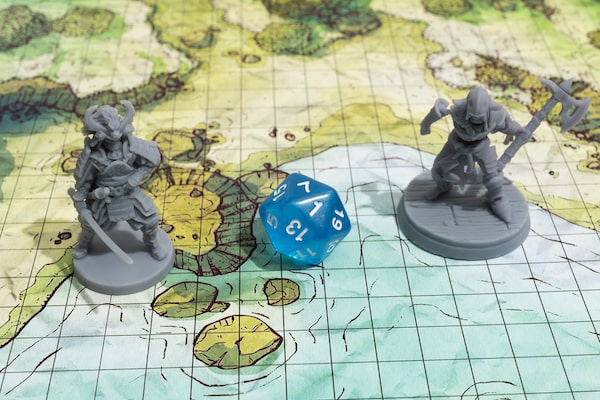{{ article.displayTitle }}
| | {{ 'ml-lesson-number-slides' | message : article.intro.bblockCount }} |
| | {{ 'ml-lesson-number-exercises' | message : article.intro.exerciseCount }} |
| | {{ 'ml-lesson-time-estimation' | message }} |
Catch-Up and Review
Here are a few recommended readings before getting started with this lesson.
Who Is Correct?
Dominika and her friends are playing a tabletop role playing game that they created. There are three different type of coins in the game — copper, silver, and gold.

Properties of Addition
The addition operation has some properties that allow to rewrite an algebraic expression without changing the values when evaluating. The first one has to do with the order of the addition.
Commutative Property of Addition
The order in which two or more terms are added does not affect the value of the sum. In other words, the addends can be written in any order.
a+b=b+a
Associative Property of Addition
The way three or more terms are grouped when added does not affect the value of the sum.
(a+b)+c=a+(b+c)
Identity Property of Addition
Adding 0 to any number always results in the number itself.
Because of this, 0 is called the Additive Identity.
Proof
Informal JustificationRolling For Speed
Dominika and her friends are playing the tabletop role playing game that they created.
Dominika's character needs to move very far as quickly as possible. It is good that she has upgrades to move faster! Her character can move 50 feet in one round, but she can roll a die to add additional distance. This additional distance can be written as d.Hint
Solution
| Step | Operation |
|---|---|
| First | Commutative Property of Addition |
| Second | Associative Property of Addition |
| Third | Evaluate the Addition |
Properties of Multiplication
Similar to the Properties of Addition, the multiplication operation has some properties that allow to rewrite an algebraic expressions without modifying the results when evaluating.
Commutative Property of Multiplication
The order in which two or more factors are multiplied does not affect the value of the product. That is, the multiplicands can be written in any order.
a⋅b=b⋅a
Associative Property of Multiplication
The way three or more factors are grouped when multiplied does not affect the value of the product.
Identity Property of Multiplication
Any number multiplied by 1 is equal to the number itself.
Because of this, the number 1 is called the Multiplicative Identity.
Proof
Informal JustificationZero Property of Multiplication
The result of multiplying any number by 0 is always 0.
Proof
Time to Attack
Dominika and Zain are preparing a cooperative attack to take down a strong enemy together.
Hint
Solution
Buying Potions
After a hard battle, Dominika and her friends went to buy some potions for health and magic.

Hint
Solution
Expressions that Represent the Same Quantity
In this lesson, different properties of operations were used to rewrite expressions into different expressions that evaluate to the same results. These expressions may be different, but they represent the same quantity and they are called equivalent expressions.
Equivalent Expression
Doing Mental Math When Buying Equipment
With the loot from their quest, Dominika and her party go to a town to buy some useful equipment. The shop gives prices in copper coins.

Hint
Rewrite each price as a multiple of 13.
Solution
A Dragon with a Quiz
Dominika and her party encountered a dragon!

Hint
Think about the different properties of operations.
Solution
Equivalent expressions have the same result for every value of the variables. These expressions are written by applying properties of operations. The properties can be applied to the given expressions to determine which are equivalent to the expression given by the dragon.
Expression (2z+71)14
The given expression can be seen as the product of two numbers. One way to get an equivalent expression is to use the Commutative Property of Multiplication.
Expression 7(14z+1)
The Distributive Property can be used to compare this expression to the given expression. When simplified, both expressions should be equal to each other if they are equivalent. The given expression can be simplified by distributing 14.Distribute 14
Multiply 14 by 2z
Multiply 14 by 71
ba=b/7a/7
1a=a
Distribute 7
Identity Property of Multiplication
Multiply 7 by 14z
ba=b/7a/7
Expression 2z+28
Consider the simplification of the dragon's expression.Expression 2+28z
Consider the simplification of the dragon's expression again.Expression 2(1+14z)
The previous expression was shown to be equivalent to the dragon's expression, so it can be compared to the final potential equivalent expression.Multiple Ways of Being Right
At the beginning of this lesson, it was mentioned that in the game there are three different types of coins with different values.

Rewrite 4x as 2⋅2x
Rewrite 2y as 2⋅1y
Factor out 2
Identity Property of Multiplication

